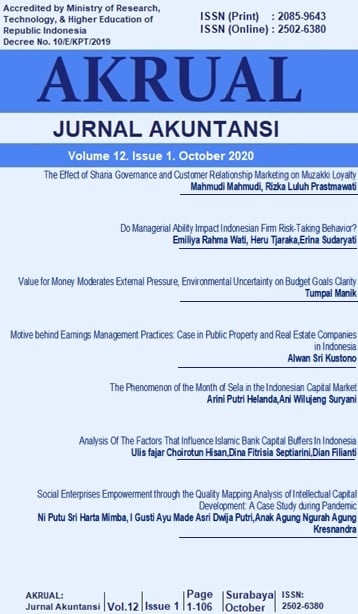The Effect of Sharia Governance and Customer Relationship Marketing on Muzakki Loyalty
DOI:
https://doi.org/10.26740/jaj.v12n1.p1-17Keywords:
Customer Relationship Marketing, Muzakki Loyalty, Sharia GovernanceAbstract
This study aims to analyze the effect of sharia governance and customer relationship marketing on muzakki loyalty. In this study, sharia governance was divided into six variables, i.e. transparency, accountability, responsibility, independence, fairness, and sharia compliance. Whereas customer relationship marketing was divided into four variables, i.e. trust, communication, commitment, and customer intimacy. We employed survey as a preferred method to obtained data. The samples of this study consisted of 200 muzakki (zakat payer) at amil zakat institutions (LAZ) in Yogyakarta, Indonesia. The data was analyzed using OLS regression techniques. The results of this research found that transparency, fairness and sharia compliance have a positive significant effect on customer loyalty, while accountability, responsiveness, and independency do not have significant effect on customer loyalty. Regarding the variable of customer relationship marketing, the result showed that communication, trust, and customer intimacy have a positive and significant effect on muzakki loyalty while commitment has no effect. It can be inferred that sharia governance and customer relationship marketing partially have a positive effect on muzakki loyalty.
References
Anggriawan, F., Widodo, J., & Kartini, T. (2015). Pengaruh Customer Intimacy Terhadap Loyalitas Nasabah Bank Rakyat Indonesia Syariah Cabang Jember. Artikel Ilmiah Mahasiswa, 1(1), 17.
Ardiansyah, D. O. (2016). Pengaruh Komunikasi Terhadap Kinerja Karyawan dengan Dimediasi oleh Kepuasan Kerja (Studi pada Bagian Produksi Pabrik Kertas PT. Setia Kawan Makmur Sejahtera Tulungagung). Jurnal Bisnis dan Manajemen, 3(1), 16-30.
Asrori. (2011). Pengungkapan Syariah Compliance dan Kepatuhan Bank Syariah Terhadap Prinsip Syariah. Jurnal Dinamika Akuntansi, 3(1), 1-7.
Fadilah, S. (2012). Penerapan Good Fovernance Pada Lembaga Amil Zakat. Bandung. Unpad Press.
Haryeni, Mulyati, Y., & Laoli, R. F. (2018). Kualitas Pelayanan, Kepercayaan, Kepuasan Nasabah dan Pengaruhnya Terhadap Loyalitas Nasabah pada Tabungan Bank Rakyat Indonesia (PERSERO) TBK Kantor Cabang Khatib Sulaiman. Jurnal Ekonomi & Bisnis Dharma Andalas, 18(1), 1939.
Husnain, M., & Akhtar, M. W. (2015). Relationship Marketing and Customer Loyalty: Evidence from Banking Sector in Pakistan. Global Journal of Management and Business Research: E Marketing, 15(10), 115.
Inayah, N., & Muanisah, Z. (2018). Hubungan Kepercayaan, Transparansi dan Akuntabilitas Terhadap Loyalitas Muzakki Pada Badan Amil Zakat. ACTIVA: Jurnal Ekonomi Syariah, 1(2), 18-33.
Indrawaty & Wardayati, S. M. (2016). Implementing Islamic Corporate Governance (ICC) and Islamic Social Reporting (ISR) in Islamic Financial Institution (IFI). Procedia Social and Behavioral Sciences 219, 338-343.
Jesri, P., Ahmadi, F., & Fatchipoor, M. (2013) Effects of Relationship Marketing (RM) on Customer Loyalty (Case Study: Mehr Bank, Kermashah Province Iran). Interdisplinary Journal of Contemporary Research Business, 4(11), 304312.
Junusi, R. El. (2016). Implementasi Syariah Governance Serta Implikasinya Terhadap Reputasi dan Kepercayaan Bank Syariah. Annual International Conference on Islamic Studies (AICIS XIII), 6(1), 18281848.
KNKG. (2006). Pedoman Umum Good Corporate Governance. Jakarta. Komite Nasional Kebijakan Governance.
Kotler, P., & Armstrong, G. (2018). Principles of Marketing. 17th Ed. London: Pearson.
Mubarok, A., & Fanani, B. (2014). Penghimpunan Dana Zakat Nasional (Potensi, Realisasi dan Peran Penting Organisasi Pengelola Zakat). PERMANA, V(2), 7-16.
Ndubisi, N. O. (2015). Relationship Marketing and Customer Loyalty. Marketing Inteligence& Planning, 7(1), 98106.
Purnamasari, I., & Darma, E. S. (2015). Pengaruh Implementasi Syariah Governance Terhadap Loyalitas Nasabah. Jurnal Akuntansi dan Investasi, 16(1), 1224.
Pusat Kajian Strategis Badan Amil Zakat Nasional (BAZNAS). (2017). Outlook Baznas Indonesia: Jakarta Pusat.
Rahman, A. (2018). Potensi Zakat Indonesia Rp 200 Triliun Tapi. https://finansial.bisnis.com/read/20180125/86/730096/potensi-zakat-indonesia-rp200-triliun-tapi.
Ramadan, R., Askandar, N. S., & Amin, M. (2018). Pengaruh Implementasi Syariah Governance Terhadap Loyalitas Nasabah. E-JRA, 07(01), 3245.
Razak, A., Baberi, J., & Ramadhan, M. I. (2018). Pengaruh Kepuasan dan Kepercayaan Terhadap Loyalitas Nasabah pada Bank Negara Indonesia (BNI) Cabang Kendari. Sigma: Journal of Economic and Business, 1(79), 1020.
Rijal, K., & Nilawati. (2019). Potensi Pembayaran Zakat Secara Online dan Offline Serta Realisasi Dana Zakat Indonesia. I-Economics: A Research Journal on Islamic Economics, 5(2), 116-131.
Rozi, A. F., Sularso, R. A., & Dimyati, M. (2014). Dampak Elemen Customer Relationship Marketing Terhadap Loyalitas Pelanggan Rumah Makan Bebek 88. Unej Jurnal 1(1), 16.
Tabrani, M., Amin, M., & Nizam, A. (2018). Trust, Commitment, Customer Trust, Commitment, Customer Intimacy and Customer Loyalty in Islamic Banking Relationship. International Journal of Bank Marketing, 36(5), 823-848.
Tjiptono, F. (2012). Strategi Pemasaran. Edisi Kedua. Yogyakarta: Andi Offset.
Yuliafitri, I. & Khoiriyah, A. N. (2016). Pengaruh Kepuasan Muzakki, Transparansi Dan Auntabilitas Pada Lembaga Amil Zakat Terhadap Loyalitas Muzakki. Islamiconimic: Jurnal Ekonomi Islam, 7(2), 205218.
Wardhani, W. K., Fauzi, A., & Arifin, Z. (2017). Pengaruh Relationship Marketing (Pemasaran Hubungan) Terhadap Loyalitas. Jurnal Administrasi Bisnis (JAB), 51(1), 3943.
Warsono, S., Amalia, F., & Rahajeng, D. K. (2009). Corporate Governance Concept and Model. Yogyakarta: Center of Good Corporate Governance.
Wantara, P. (2015). The Relationships Among Service Quality, Customer Satisfaction, and Customer Loyalty in Library Services. International Journal of Economics and Financial Issues, 5(1), 264269.
Downloads
Published
How to Cite
Issue
Section
License
Copyright (c) 2020 AKRUAL: Jurnal Akuntansi

This work is licensed under a Creative Commons Attribution-NonCommercial 4.0 International License.
 Abstract views: 990
,
Abstract views: 990
, PDF Downloads: 772
PDF Downloads: 772


















